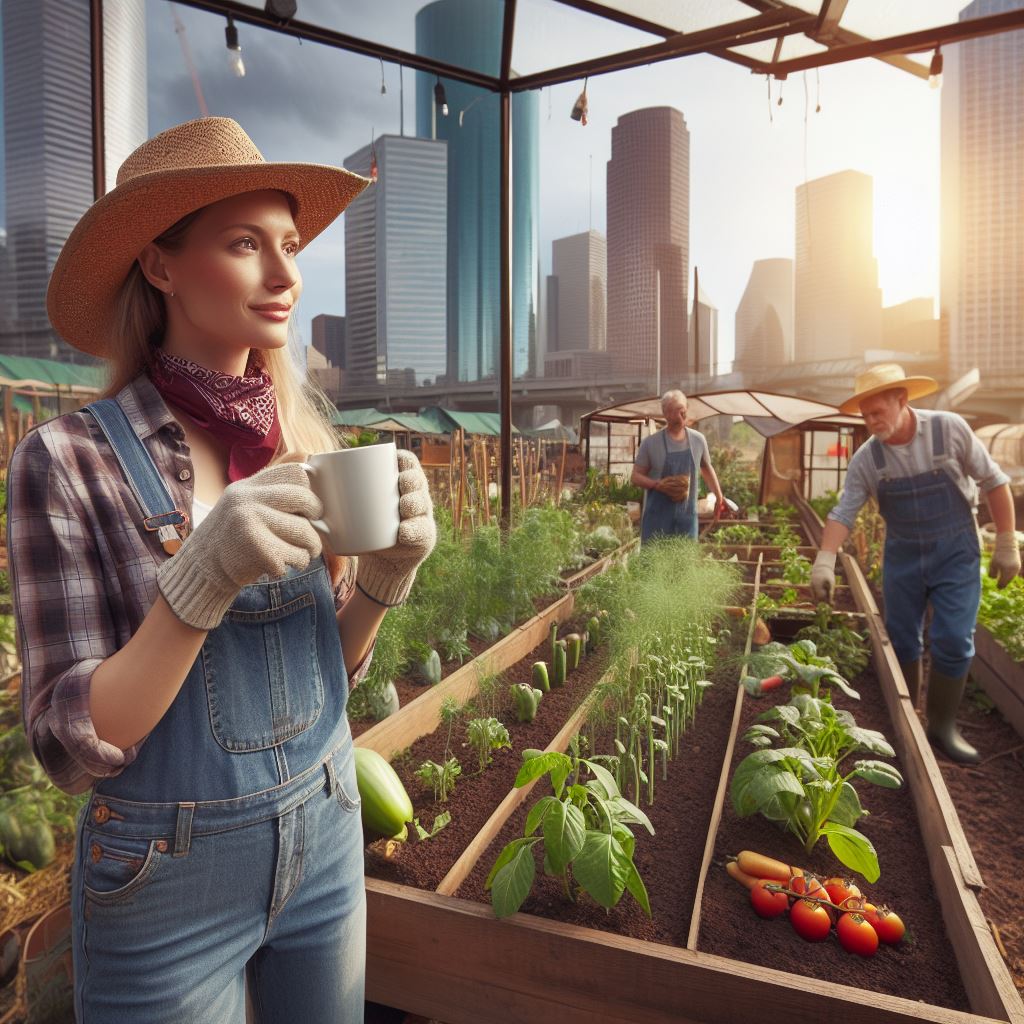Introduction
Urban vineyards are small-scale vineyards located in urban areas, often in the heart of cities.
These vineyards are a unique combination of urban living and wine production.
Dallas, Texas, has its share of urban vineyards that tell a fascinating story.
The story of urban vineyards in Dallas is rooted in the city’s commitment to sustainability and its growing interest in local food production.
These vineyards have become symbols of the city’s efforts to promote urban agriculture and provide a unique experience for its residents.
One such unique tale is the Deep Ellum Winery, located in the vibrant Deep Ellum neighborhood.
This urban vineyard was established in 2014 and has been producing high-quality wines ever since.
The winery not only offers a diverse selection of wines but also educates the community about sustainable winemaking practices.
Another urban vineyard that stands out is the Four Springs Vineyard, situated in the historic district of Trinity Groves.
This vineyard embraces the concept of “farm-to-table” by growing a variety of grapes that are used to produce their own wines.
Visitors can enjoy the scenic views while savoring the fruits of the vineyard’s labor.
Urban vineyards in Dallas are not only a source of local wine but also serve as community gathering spaces.
These vineyards often host events, wine tastings, and educational workshops, giving residents an opportunity to connect with their city’s agricultural roots.
In summary, urban vineyards in Dallas represent the city’s dedication to sustainability and its growing enthusiasm for local food production.
These vineyards provide a unique and immersive experience for residents, showcasing the beauty of combining urban living with agriculture.
Step into one of these vineyards, and you’ll discover a whole new side of Dallas.
History of Urban Vineyards in Dallas
Urban vineyards have become a unique trend in Dallas, with a rich history that showcases the city’s passion for wine and innovation.
This section explores the emergence of urban vineyards in Dallas, the pioneers who started the trend, and the motivations behind creating vineyards in an urban setting.
Early Days and Emerging Trend
- Dallas has a long-standing history of embracing innovation and creativity in various industries.
- The emergence of urban vineyards in Dallas can be traced back to the early 2000s.
- As the city grew and underwent urban revitalization, the idea of cultivating vineyards in an urban setting began to captivate the imaginations of locals.
Pioneers of Urban Vineyards in Dallas
- One of the pioneers who started the trend is Thomas Hudgins, a visionary entrepreneur.
- Hudgins recognized the potential in utilizing untapped urban spaces to cultivate vineyards.
- Another influential figure in the early days of urban vineyards was Katherine Stark, a passionate winemaker.
Motivations behind Creating Vineyards in an Urban Setting
- Urban vineyards offer a unique opportunity to bring nature and agriculture back into the concrete jungle.
- For many vineyard owners, the motivation lies in creating a sustainable and environmentally friendly space.
- By utilizing urban spaces, vineyards contribute to the preservation of green spaces and the revitalization of neighborhoods.
Showcasing Local Flavors and Techniques
- Urban vineyards in Dallas embrace the uniqueness of the local climate and soil.
- These vineyards focus on growing grape varieties that thrive in the Texan climate.
- By showcasing local flavors and techniques, urban vineyards contribute to the diversity and richness of the Texan wine industry.
Community Engagement and Education
- Urban vineyards in Dallas often organize events and activities to engage the local community.
- Wine tastings, tours, and educational seminars are commonly offered to share knowledge and foster a sense of community.
- These initiatives aim to demystify the winemaking process and create a deeper appreciation for locally produced wines.
Economic Impact and Job Creation
- The rise of urban vineyards in Dallas has led to a boost in the local economy.
- These vineyards create jobs in various fields, including viticulture, hospitality, and tourism.
- Visitors from both within and outside the city contribute to the economic growth of urban vineyards.
Sustainability and Environmental Benefits
- Urban vineyards prioritize sustainable practices, including organic farming and water conservation.
- By utilizing urban spaces, these vineyards reduce the need for long-distance transportation, lowering the carbon footprint.
- They also contribute to the overall urban ecosystem by providing a habitat for birds and other wildlife.
In fact, the emergence of urban vineyards in Dallas is a testament to the city’s innovative spirit.
Through the vision of pioneers, the motivation to create sustainable spaces in an urban setting, and the commitment to community engagement and education, urban vineyards have become an integral part of Dallas’s cultural landscape.
As the trend continues to grow, these vineyards will undoubtedly leave a lasting impact on the city’s wine industry and create a unique experience for wine enthusiasts and locals alike.
Read: Maine Lobsterman’s Sustainable Practices
Challenges and Solutions
Urban vineyards in Dallas face several challenges as they try to flourish amidst the concrete jungle.
Lack of space and soil quality issues are major obstacles, but innovative solutions have been implemented to overcome them:
Lack of Space
- Urban areas in Dallas often have limited open spaces suitable for vineyard cultivation.
- Land scarcity makes it difficult to allocate large areas of land for traditional vineyard practices.
- Urban vineyards have to make the most of available space, whether it’s rooftops, balconies, or unused urban lots.
Soil Quality Issues
- In urban environments, soil quality is often degraded or contaminated.
- Pollution, construction, and previous land usage can render soils unfit for vine cultivation.
Vertical Gardening Techniques
- Urban vineyards in Dallas have adopted vertical gardening techniques to maximize space utilization.
- Vertical systems such as trellises or espaliers allow vines to grow upward instead of spreading horizontally.
- This technique allows more vines to be cultivated within a limited space, increasing grape production.
Hydroponics
- Hydroponics, a soil-less growing method, has become popular among urban vineyards in Dallas.
- By growing vines in nutrient-rich water solutions, the need for traditional soil is eliminated.
- Hydroponics allows vineyards to overcome soil quality issues and achieve optimal growth and grape yield.
Container Gardening
- Container gardening is another solution to address space limitations in urban vineyards.
- Vines are cultivated in large containers or pots, which can be placed on rooftops or balconies.
- This method enables vineyards to create portable gardens that can adapt to changing urban landscapes.
Community Collaboration
- Urban vineyards in Dallas actively participate in community collaboration efforts.
- These vineyards establish partnerships with local organizations, businesses, and individuals.
- By collaborating, vineyards can access additional space, resources, and expertise, fostering a supportive network.
Despite the challenges faced by urban vineyards in Dallas, their determination and innovative approaches have allowed them to overcome these obstacles.
Through techniques such as vertical gardening and hydroponics, these vineyards have transformed urban spaces into vibrant, fruitful vineyards.
Read: Dairy Farmer’s Journey to Sustainability

Benefits of Urban Vineyards
Urban vineyards not only add charm and character to the cityscape, but they also bring several environmental benefits.
Let’s explore the positive impact these vineyards have on the urban ecosystem:
Reduction of Carbon Footprint
- By cultivating grapes locally in urban vineyards, there is a significant reduction in carbon emissions caused by transportation.
- Fewer miles traveled means less fuel consumption and less air pollution, leading to cleaner air quality.
- Locally produced wines result in a smaller carbon footprint compared to traditionally produced wines transported across long distances.
Increased Biodiversity in Urban Areas
- Urban vineyards provide a haven for various plant and animal species, contributing to enhanced biodiversity within cities.
- The diverse vegetation in vineyards attracts insects, birds, and other pollinators, creating a thriving ecological balance.
- These green spaces promote the establishment of insect habitats, beneficial for natural pest control, reducing the need for harmful pesticides.
The presence of urban vineyards helps to create interconnected green corridors throughout the city, facilitating the movement of wildlife and promoting ecological resilience.
The increased biodiversity enhances the overall urban ecosystem, making it more sustainable and resilient to climate change.
In addition to the environmental benefits, urban vineyards also offer several social and economic advantages:
Transform Your Agribusiness
Unlock your farm's potential with expert advice tailored to your needs. Get actionable steps that drive real results.
Get StartedCommunity Engagement and Education
- Urban vineyards provide a unique opportunity for community engagement and participation in agricultural practices.
- Residents can actively participate in vineyard maintenance, grape harvesting, and wine-making, fostering a sense of ownership and connection to their surroundings.
- These vineyards serve as educational platforms, allowing urban dwellers to learn about viticulture, wine production, and sustainable farming practices.
Economic Development
- The establishment of urban vineyards creates job opportunities, ranging from vineyard management to wine tourism.
- Vineyards can attract tourists and wine enthusiasts, boosting local businesses such as restaurants, hotels, and wine tasting venues.
- The production and sale of urban wines provide economic benefits to the city and its inhabitants, contributing to the growth of the local economy.
Overall, urban vineyards make cities more environmentally sustainable, socially engaging, and economically prosperous.
By utilizing unused spaces for cultivating grapes, these vineyards showcase an innovative approach towards urban agriculture, improving the quality of life for urban residents.
Read: Sowing Hope: Farming in Changing Climes
Community Engagement and Education
Urban vineyards play a significant role in fostering community engagement and education in Dallas.
These vineyards not only bring people together but also create opportunities for knowledge sharing and skill development.
Here are some ways in which urban vineyards contribute to community engagement and education:
Farm-to-table initiatives
Urban vineyards in Dallas are at the forefront of the farm-to-table movement, emphasizing the importance of locally sourced products.
By cultivating vineyards within the city limits, these initiatives reduce the carbon footprint associated with transportation while ensuring fresher and more sustainable produce for the community.
Through partnerships with local restaurants, urban vineyards promote a closer relationship between consumers and the sources of their food and beverages.
Direct sales to local restaurants
Urban vineyards supply their wines directly to local restaurants, establishing a direct connection between the growers and the consumers.
By eliminating the middlemen, these vineyards not only support local businesses but also provide a unique experience for diners.
This face-to-face interaction creates a sense of community and encourages conversations about the origin and characteristics of the wines, fostering a deeper appreciation for the hard work put into each bottle.
Educational programs and workshops
Urban vineyards understand the importance of education and actively offer programs and workshops to the public.
These initiatives aim to increase knowledge about viticulture, winemaking, and the overall wine industry.
Through hands-on experiences, participants can learn about vineyard management, grape harvesting, wine production, and even wine tasting techniques.
Such programs not only promote lifelong learning but also encourage individuals to develop a deeper passion for wine while supporting local urban agriculture.
Additionally, these educational programs may include collaborations with schools and universities to introduce students to the science and art of winemaking.
By incorporating viticulture and oenology into the curriculum, students gain practical knowledge and an understanding of the agricultural heritage of their city.
These initiatives not only broaden horizons but also inspire future generations to pursue careers in wine-related fields, contributing to the growth of the local industry.
In short, urban vineyards in Dallas actively engage with the community through farm-to-table initiatives, direct sales to local restaurants, and various educational programs and workshops.
By embracing their role as community partners, these vineyards foster a sense of pride, promote sustainable practices, and enhance the cultural fabric of the city.
Through their commitment to community engagement and education, urban vineyards have become an integral part of Dallas’ unique tale.
Read: Fencing Fields: A Sheep Farmer Diary
Success Stories
Urban vineyards in Dallas have not only flourished but also garnered recognition, awards, and have had a significant impact on the local community.
Let’s take a closer look at some success stories:
- The Dallas Wine Collective is renowned for its contributions to the local wine scene, recognized for excellence.
- They’ve garnered multiple awards, including the prestigious Dallas Wine Competition, for their exceptional wines.
- Hosting events like wine tastings and workshops, the vineyard actively engages with the community.
- Urban vineyards bring sophistication to the city and breathe life into urban spaces.
- Emphasizing locally sourced produce, they attract tourists and locals with unique wine experiences.
- Local restaurants proudly feature wines from these vineyards, elevating the city’s culinary reputation.
- Their success creates job opportunities and boosts the local economy.
- Deep Ellum Winery innovates winemaking and champions sustainable practices, gaining recognition.
- Promoting rainwater harvesting and organic agriculture, urban vineyards prioritize environmentally-friendly practices.
- Collaborating with local businesses and artists, they foster community and mutual support.
These success stories demonstrate the transformative power of urban vineyards in Dallas.
They have not only elevated the city’s wine culture but also contributed to its economic growth and community engagement.
By embracing urban viticulture, Dallas has created a unique and flourishing wine scene.
Explore Further: Family Farming Tales: A 5-Acre Success Story
Future prospects and Expansion
In recent years, the concept of urban vineyards in Dallas has gained significant traction, and the future looks promising for further growth and expansion.
With a thriving wine culture and increasing interest from residents and entrepreneurs, the potential for urban vineyards in Dallas is immense.
Potential for further growth
- The growing demand for locally sourced, sustainable produce has created an ideal environment for the expansion of urban vineyards in Dallas.
- The city’s favorable climate, with mild winters and long, warm summers, provides ideal conditions for grape cultivation.
- As the market for locally produced wine continues to grow, urban vineyards are poised to meet the increasing demand.
- With advancements in technology and sustainable farming practices, urban vineyards can maximize yield and production efficiency.
- The availability of underutilized urban spaces presents opportunities for innovative vineyard designs and expansion projects.
Increasing interest from residents and entrepreneurs
- Dallas residents have shown a growing interest in supporting local businesses and sustainable agriculture, making urban vineyards an attractive investment.
- Entrepreneurs recognize the potential profitability of urban vineyards due to low overhead costs and the growing market demand for locally produced wine.
- Local winemakers have started to establish collaborations with urban vineyards, creating a mutually beneficial relationship.
- Residents are also becoming more engaged in the wine-making process through vineyard tours, tastings, and wine education programs.
- Restaurants and wine bars in Dallas are increasingly showcasing locally produced wines, further driving the demand for urban vineyards.
Possible challenges and opportunities in the future
- Despite the positive outlook, urban vineyards in Dallas may face challenges such as zoning restrictions and limited available land.
- However, these challenges can be seen as opportunities for innovation, inspiring vineyard owners to find creative ways to utilize urban spaces.
- Collaboration between vineyards, city officials, and urban planners can help overcome any potential hurdles and encourage the growth of urban vineyards.
- Educational initiatives and workshops can be implemented to promote sustainable farming practices and enhance the quality of locally produced wine.
- New technologies, such as hydroponics and vertical farming, can be explored to maximize crop yields and conserve land resources.
As urban vineyards continue to flourish in Dallas, there is a bright future ahead.
The combination of increasing interest from residents and entrepreneurs, along with favorable market conditions, sets the stage for continued growth and expansion.
Through collaboration, innovation, and a commitment to sustainable practices, urban vineyards are transforming Dallas into a hub for local wine production and a unique destination for wine enthusiasts.
Conclusion
Urban vineyards in Dallas offer a unique experience unlike any other.
They bring together the beauty of nature and the vibrancy of city life, creating an extraordinary blend.
The city’s commitment to sustainability and local food production is evident in these vineyards, as they provide a valuable source of fresh food and contribute to the overall environmental health of the area.
Visiting or supporting urban vineyards in your own community is not only a great way to enjoy delicious wine, but also a way to support local businesses and promote sustainability.
By doing so, you can contribute to the growth of urban agriculture and help create a more sustainable and resilient food system.
So, whether you are a wine enthusiast or simply looking for a unique experience, I encourage you to explore the urban vineyards in your area.
Take a stroll through the vineyards, learn about the winemaking process, and taste the fruits of urban agriculture.
By doing so, you will not only enjoy a delightful time but also contribute to the sustainability and local food movement that is transforming cities around the world.
In closing, urban vineyards in Dallas, and in any city for that matter, are a testament to the possibilities of sustainable and local food production in an urban environment.
So go ahead, visit or support the urban vineyards in your community and be a part of this unique tale.




